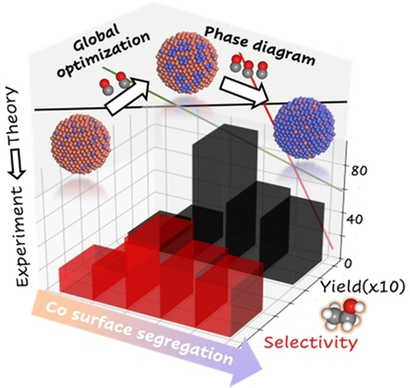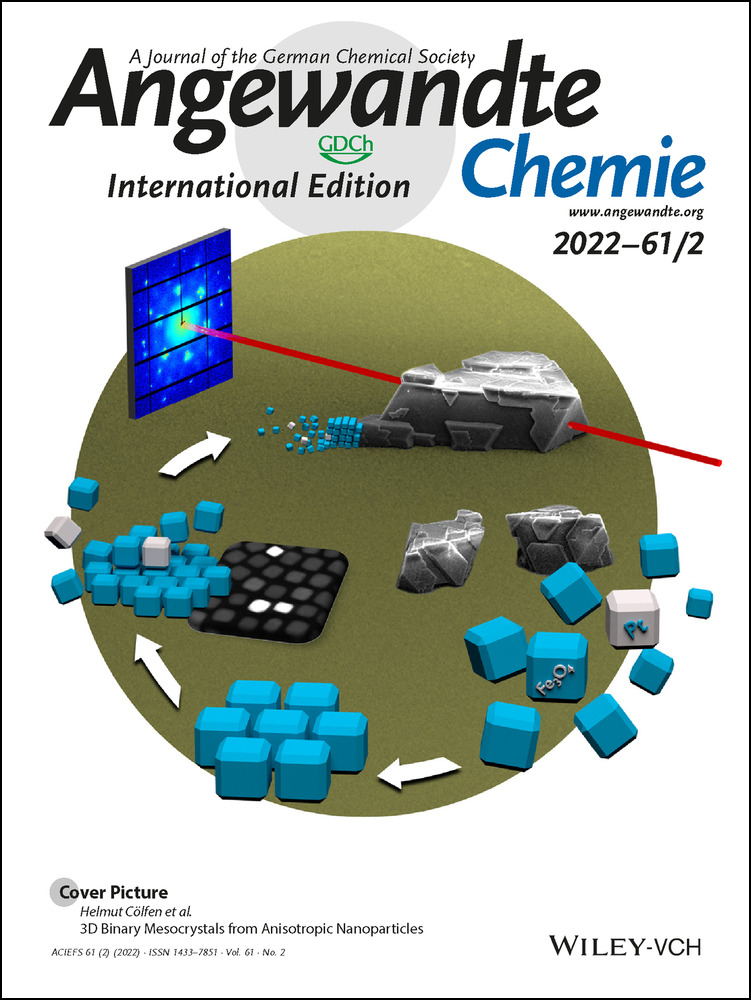Moderate Surface Segregation Promotes Selective Ethanol Production in CO2 Hydrogenation Reaction over CoCu Catalysts
Sihang Liu
Key Laboratory for Green Chemical Technology of Ministry of Education, School of Chemical Engineering and Technology, Collaborative Innovation Center of Chemical Science & Engineering, Tianjin University, Weijin Road 92, Tianjin, 300072 China
Present address: Catalysis Theory Center, Department of Physics, Technical University of Denmark (DTU), 2800 Kgs., Lyngby, Denmark
Search for more papers by this authorDr. Chengsheng Yang
Key Laboratory for Green Chemical Technology of Ministry of Education, School of Chemical Engineering and Technology, Collaborative Innovation Center of Chemical Science & Engineering, Tianjin University, Weijin Road 92, Tianjin, 300072 China
Search for more papers by this authorShenjun Zha
Institute of Catalysis Research and Technology, Karlsruhe Institute of Technology, Hermann-von-Helmholtz-Platz 1, 76344 Eggenstein-Leopoldshafen, Germany
Search for more papers by this authorDr. Dmitry Sharapa
Institute of Catalysis Research and Technology, Karlsruhe Institute of Technology, Hermann-von-Helmholtz-Platz 1, 76344 Eggenstein-Leopoldshafen, Germany
Search for more papers by this authorProf. Dr. Felix Studt
Institute of Catalysis Research and Technology, Karlsruhe Institute of Technology, Hermann-von-Helmholtz-Platz 1, 76344 Eggenstein-Leopoldshafen, Germany
Institute for Chemical Technology and Polymer Chemistry, Karlsruhe Institute of Technology, Engesserstr. 18, 76131 Karlsruhe, Germany
Search for more papers by this authorCorresponding Author
Prof. Dr. Zhi-Jian Zhao
Key Laboratory for Green Chemical Technology of Ministry of Education, School of Chemical Engineering and Technology, Collaborative Innovation Center of Chemical Science & Engineering, Tianjin University, Weijin Road 92, Tianjin, 300072 China
Search for more papers by this authorProf. Dr. Jinlong Gong
Key Laboratory for Green Chemical Technology of Ministry of Education, School of Chemical Engineering and Technology, Collaborative Innovation Center of Chemical Science & Engineering, Tianjin University, Weijin Road 92, Tianjin, 300072 China
Joint School of National University of Singapore and Tianjin University, International Campus of Tianjin University, Binhai New City, Fuzhou, 350207 China
Search for more papers by this authorSihang Liu
Key Laboratory for Green Chemical Technology of Ministry of Education, School of Chemical Engineering and Technology, Collaborative Innovation Center of Chemical Science & Engineering, Tianjin University, Weijin Road 92, Tianjin, 300072 China
Present address: Catalysis Theory Center, Department of Physics, Technical University of Denmark (DTU), 2800 Kgs., Lyngby, Denmark
Search for more papers by this authorDr. Chengsheng Yang
Key Laboratory for Green Chemical Technology of Ministry of Education, School of Chemical Engineering and Technology, Collaborative Innovation Center of Chemical Science & Engineering, Tianjin University, Weijin Road 92, Tianjin, 300072 China
Search for more papers by this authorShenjun Zha
Institute of Catalysis Research and Technology, Karlsruhe Institute of Technology, Hermann-von-Helmholtz-Platz 1, 76344 Eggenstein-Leopoldshafen, Germany
Search for more papers by this authorDr. Dmitry Sharapa
Institute of Catalysis Research and Technology, Karlsruhe Institute of Technology, Hermann-von-Helmholtz-Platz 1, 76344 Eggenstein-Leopoldshafen, Germany
Search for more papers by this authorProf. Dr. Felix Studt
Institute of Catalysis Research and Technology, Karlsruhe Institute of Technology, Hermann-von-Helmholtz-Platz 1, 76344 Eggenstein-Leopoldshafen, Germany
Institute for Chemical Technology and Polymer Chemistry, Karlsruhe Institute of Technology, Engesserstr. 18, 76131 Karlsruhe, Germany
Search for more papers by this authorCorresponding Author
Prof. Dr. Zhi-Jian Zhao
Key Laboratory for Green Chemical Technology of Ministry of Education, School of Chemical Engineering and Technology, Collaborative Innovation Center of Chemical Science & Engineering, Tianjin University, Weijin Road 92, Tianjin, 300072 China
Search for more papers by this authorProf. Dr. Jinlong Gong
Key Laboratory for Green Chemical Technology of Ministry of Education, School of Chemical Engineering and Technology, Collaborative Innovation Center of Chemical Science & Engineering, Tianjin University, Weijin Road 92, Tianjin, 300072 China
Joint School of National University of Singapore and Tianjin University, International Campus of Tianjin University, Binhai New City, Fuzhou, 350207 China
Search for more papers by this authorGraphical Abstract
Abstract
Cobalt-copper (CoCu) catalysts have industrial potential in CO/CO2 hydrogenation reactions, and CoCu alloy has been elucidated as a major active phase during reactions. However, due to elemental surface segregation and dealloying phenomena, the actual surface morphology of CoCu alloy is still unclear. Combining theory and experiment, the dual effect of surface segregation and varied CO coverage over the CoCu(111) surface on the reactivity in CO2 hydrogenation reactions is explored. The relationship between C−O bond scission and further hydrogenation of intermediate *CH2O was discovered to be a key step to promote ethanol production. The theoretical investigation suggests that moderate Co segregation provides a suitable surface Co ensemble with lateral interactions of co-adsorbed *CO, leading to promoted selectivity to ethanol, in agreement with theory-inspired experiments.
Conflict of interest
The authors declare no conflict of interest.
Supporting Information
As a service to our authors and readers, this journal provides supporting information supplied by the authors. Such materials are peer reviewed and may be re-organized for online delivery, but are not copy-edited or typeset. Technical support issues arising from supporting information (other than missing files) should be addressed to the authors.
| Filename | Description |
|---|---|
| anie202109027-sup-0001-misc_information.pdf10.4 MB | Supporting Information |
Please note: The publisher is not responsible for the content or functionality of any supporting information supplied by the authors. Any queries (other than missing content) should be directed to the corresponding author for the article.
References
- 1
- 1aH. T. Luk, C. Mondelli, D. C. Ferre, J. A. Stewart, J. Perez-Ramirez, Chem. Soc. Rev. 2017, 46, 1358–1426;
- 1bZ. Shi, H. Yang, P. Gao, X. Li, L. Zhong, H. Wang, H. Liu, W. Wei, Y. Sun, Catal. Today 2018, 311, 65–73.
- 2M. Behrens, F. Studt, I. Kasatkin, S. Kuhl, M. Havecker, F. Abild-Pedersen, S. Zander, F. Girgsdies, P. Kurr, B. L. Kniep, M. Tovar, R. W. Fischer, J. K. Norskov, R. Schlögl, Science 2012, 336, 893–897.
- 3
- 3aY. Xiang, N. Kruse, J. Energy Chem. 2016, 25, 895–906;
- 3bJ. Su, Z. Zhang, D. Fu, D. Liu, X.-C. Xu, B. Shi, X. Wang, R. Si, Z. Jiang, J. Xu, Y.-F. Han, J. Catal. 2016, 336, 94–106;
- 3cY. Xiang, V. Chitry, P. Liddicoat, P. Felfer, J. Cairney, S. Ringer, N. Kruse, J. Am. Chem. Soc. 2013, 135, 7114–7117.
- 4
- 4aA. Cao, J. Schumann, T. Wang, L. Zhang, J. Xiao, P. Bothra, Y. Liu, F. Abild-Pedersen, J. K. Nørskov, ACS Catal. 2018, 8, 10148–10155;
- 4bJ. Schumann, A. J. Medford, J. S. Yoo, Z.-J. Zhao, P. Bothra, A. Cao, F. Studt, F. Abild-Pedersen, J. K. Nørskov, ACS Catal. 2018, 8, 3447–3453;
- 4cA. J. Medford, A. C. Lausche, F. Abild-Pedersen, B. Temel, N. C. Schjødt, J. K. Nørskov, F. Studt, Top. Catal. 2014, 57, 135–142.
- 5S. Carenco, A. Tuxen, M. Chintapalli, E. Pach, C. Escudero, T. D. Ewers, P. Jiang, F. Borondics, G. Thornton, A. P. Alivisatos, H. Bluhm, J. Guo, M. Salmeron, J. Phys. Chem. C 2013, 117, 6259–6266.
- 6G. Collinge, N. Kruse, J.-S. McEwen, J. Catal. 2018, 368, 31–37.
- 7
- 7aB. Eren, D. Torres, O. Karslioglu, Z. Liu, C. H. Wu, D. Stacchiola, H. Bluhm, G. A. Somorjai, M. Salmeron, J. Am. Chem. Soc. 2018, 140, 6575–6581;
- 7bG. Collinge, N. Kruse, J.-S. McEwen, J. Phys. Chem. C 2017, 121, 2181–2191;
- 7cY. Xiang, R. Barbosa, N. Kruse, ACS Catal. 2014, 4, 2792–2800.
- 8
- 8aX. Zhang, S. Han, B. Zhu, G. Zhang, X. Li, Y. Gao, Z. Wu, B. Yang, Y. Liu, W. Baaziz, O. Ersen, M. Gu, J. T. Miller, W. Liu, Nat. Catal. 2020, 3, 411–417;
- 8bI. Zegkinoglou, L. Pielsticker, Z.-K. Han, N. J. Divins, D. Kordus, Y.-T. Chen, C. Escudero, V. Perez-Dieste, B. Zhu, Y. Gao, B. Roldan Cuenya, J. Phys. Chem. C 2019, 123, 8421–8428;
- 8cM. A. van Spronsen, K. Daunmu, C. R. O'Connor, T. Egle, H. Kersell, J. Oliver-Meseguer, M. B. Salmeron, R. J. Madix, P. Sautet, C. M. Friend, J. Phys. Chem. C 2019, 123, 8312–8323.
- 9S. Liu, Z.-J. Zhao, C. Yang, S. Zha, K. M. Neyman, F. Studt, J. Gong, ACS Catal. 2019, 9, 5011–5018.
- 10
- 10aF. C. Chuang, C. V. Ciobanu, V. B. Shenoy, C. Z. Wang, K. M. Ho, Surf. Sci. 2004, 573, L375–L381;
- 10bS. Liu, J. Zong, Z.-J. Zhao, J. Gong, Green Chem. Eng. 2020, 1, 56–62.
- 11E. A. Lewis, D. Le, A. D. Jewell, C. J. Murphy, T. S. Rahman, E. C. Sykes, Chem. Commun. 2014, 50, 6537–6539.
- 12E. A. Lewis, M. D. Marcinkowski, C. J. Murphy, M. L. Liriano, E. C. Sykes, J. Phys. Chem. Lett. 2014, 5, 3380–3385.
- 13N. Yang, A. J. Medford, X. Liu, F. Studt, T. Bligaard, S. F. Bent, J. K. Norskov, J. Am. Chem. Soc. 2016, 138, 3705–3714.
- 14
- 14aF. Romero-Sarria, L. F. Bobadilla, E. M. Jiménez Barrera, J. A. Odriozola, Appl. Catal. B 2020, 272, 119032;
- 14bC. Yang, S. Liu, Y. Wang, J. Song, G. Wang, S. Wang, Z. J. Zhao, R. Mu, J. Gong, Angew. Chem. Int. Ed. 2019, 58, 11242–11247; Angew. Chem. 2019, 131, 11364–11369;
- 14cL. Liu, F. Fan, Z. Jiang, X. Gao, J. Wei, T. Fang, J. Phys. Chem. C 2017, 121, 26287–26299.
- 15
- 15aL. Wang, L. Wang, J. Zhang, X. Liu, H. Wang, W. Zhang, Q. Yang, J. Ma, X. Dong, S. J. Yoo, J. G. Kim, X. Meng, F. S. Xiao, Angew. Chem. Int. Ed. 2018, 57, 6104–6108; Angew. Chem. 2018, 130, 6212–6216;
- 15bZ. An, X. Ning, J. He, J. Catal. 2017, 356, 157–164.
- 16
- 16aS. Lin, J. Ma, X. Ye, D. Xie, H. Guo, J. Phys. Chem. C 2013, 117, 14667–14676;
- 16bC. Chen, Q. Wang, G. Wang, B. Hou, L. Jia, D. Li, J. Phys. Chem. C 2016, 120, 9132–9147.
- 17D. Mei, R. Rousseau, S. M. Kathmann, V.-A. Glezakou, M. H. Engelhard, W. Jiang, C. Wang, M. A. Gerber, J. F. White, D. J. Stevens, J. Catal. 2010, 271, 325–342.
- 18L. A. Cramer, Y. Liu, P. Deshlahra, E. C. H. Sykes, J. Phys. Chem. Lett. 2020, 11, 5844–5848.
- 19M. Vandichel, A. Moscu, H. Grönbeck, ACS Catal. 2017, 7, 7431–7441.
- 20C. H. Wu, C. Liu, D. Su, H. L. Xin, H.-T. Fang, B. Eren, S. Zhang, C. B. Murray, M. B. Salmeron, Nat. Catal. 2019, 2, 78–85.





